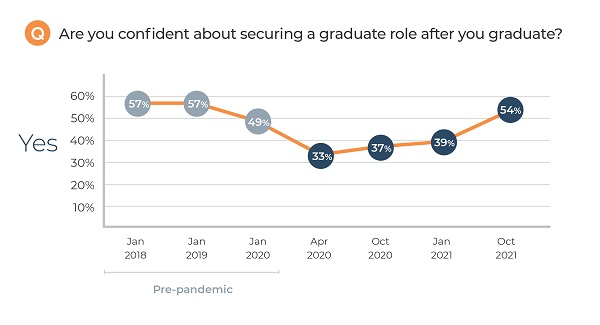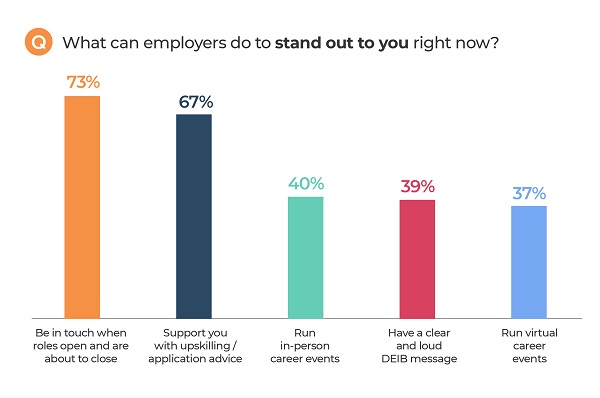The latest on-campus research shows how employers can better attract and retain graduates, says Ben Triggs from Bright Network.
When it comes to graduate careers, there’s a lot to be positive about this term – students are back on campus, there’s never been more graduate roles on the Bright Network platform and confidence has returned.
This renewed confidence comes both from graduates looking ahead to their careers and many employers hiring at greater levels to make up for the shortfall during the pandemic. It gives us every reason to look ahead with confidence that today’s graduates will become the leaders of tomorrow and UK businesses will flourish as a result.
However, for this vision to be fully realised, now’s the time to drive forward change and understand the needs of the next generation.
Bright Network’s campus research of 2,500 current undergraduates and recent graduates gives insight into three core priorities to better attract and retain graduates.
Confidence is returning but students need upskilling
Bright Network’s confidence tracker (see graph 1) shows that graduate confidence has returned to pre-pandemic levels, up to 54% from lows of 33% at the start of the first lockdown in April 2020. A good sign, but there are still 46% of students and recent graduates not confident about securing a graduate level role after university.

Job opportunities are there, and unemployment is low, but students don’t feel prepared to take the graduate level jobs open to them. Less than half (49%) believe their studies haven’t prepared them for the changing job market and 78% say they feel they need more training before even entering the working world.
Here lies an opportunity for employers to lead initiatives to support students at university – not only highlighting what is going to be important as we look at the jobs of the future, but also supporting all students to understand the careers they can go into, make better decisions on what they want to do and gain skills to allow them to hit the ground running from day one. An excellent example of this in action is the recently launched Clyde & Co Academy.
By creating these spaces to learn, not only will employers benefit from work ready graduates, but it also increases brand awareness and positive sentiment across the student population.
The hybrid balancing act
Reading some articles on LinkedIn, often from America, you may be led to believe that all of Generation Z want to pick their hours, have flexibility to do side hustles and are looking for portfolio careers.
Bright Network’s research suggests there are elements of flexibility that employers would be wise to offer, but graduates are still predominantly looking for the security and learning environment a graduate role will offer them.
Employers who can adjust quickest to provide a good balance between office and homeworking, but also a career with clear progress opportunities and chances to develop beyond the role will attract and retain more graduates.
Research suggests that only 6% of graduates want a fully remote role, with most (78%) wanting a mix between at home and in the office.
The most common worry about being at home too much is that they will miss out on the informal learning opportunities that come from being around more experienced professionals and their peers. This loss of human connection and learning is evident in ISE’s October poll.
There’s a responsibility for all levels of the business to be present in the office at least part of the time and the company to set up collaborative workspaces so graduates can soak up all the knowledge that experience provides.
It’s the time to drive social mobility
When asked whether they believed the graduate recruitment marketplace is inclusive for all backgrounds, 50% of students said that it was not and this increased when looking at data from those from a Black heritage background or having attended a non-selective state school.
On top of that, 77% of the student population believed that the pandemic widened inequalities for young people entering the working world.
As companies focused on getting through the pandemic and rapidly changed their ways of working, it’s understandable why some pre-pandemic initiatives didn’t expand or were even cut back. The focus now must return to supporting everyone to fulfil their potential, regardless of background.

Recent reports still highlight inequality in early career earnings and the ability to secure formal work experience based on educational background. The upskilling agenda discussed above will gradually support more students from underrepresented groups to gain access to opportunities, but there also needs to be careful consideration on how to create a path to senior leadership when they start at the company.
Beyond upskilling, role models are vital to enfranchise all young people in the future of work. Bright Network research highlights role models as one of the key considerations for those from a Black heritage background when choosing, or even ruling out, the companies they are keen to work at.
Location is another important factor. Out of the Bright Network members who secured a role through the pandemic, 31% said they accepted a role in a location they wouldn’t have done before the pandemic. Offering flexibility in location, days in the office and hours, broadens talent pools for employers and opens more career paths for students from the poorest areas and backgrounds.
For more from Bright Network, head to the research section of our Illuminate Hub.
Watch ISE’s webinar Can I have your attention? Why student engagement is a challenge this autumn


0 Comments